
by Jacqueline Jenkins (Jordan) | Sep 9, 2015 | 2015, Jordan, Older Children, School, World Moms Blog, World Motherhood, Younger Children
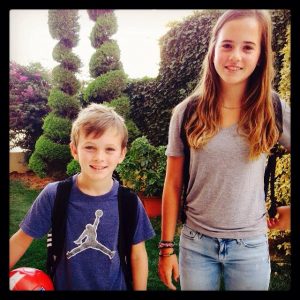
First day of school! #worldmoms
September is the month of renewal for parents, educators and children, as they return to school to start a new academic year. The smell of the starch in the children’s shirts and the taste of the anticipation and excitement in the air was almost palpable today as I walked into assembly at the Amman Baccalaureate School in Amman, Jordan, where I am consulting.
As the assembly hour unfolded with talk of teamwork, youth empowerment, holistic education and global mindedness, my heart and soul began to swell. At one point I whispered aloud to myself, “I am with my people, this is my language.”
As parents, we hope for and strive to put our children in educational environments where academic performance is solely one piece of the much bigger educational pie. We yearn for our children to exit the educational system after grade 12 with a sense of global responsibility, an ability to empathize with those less fortunate than themselves, as lifelong learners steeped in an understanding of their own unique heritage and mother tongue with strong academic skills as the spine to all this greater knowledge. As an educator, I know that data supports these values and shows this to be the education with the most impact.
Over the next few weeks, homes around the world will fill with stories from the first days of the 2015/16 academic year and there will no doubt be celebrations of friendships renewed, as well as, tears from children who feel disappointed with their class placement.
These precious moments provide us, as parents, a unique teachable moment.
Don’t miss this opportunity to introduce terms like resilience and grit; characteristics, which, in the long run, will mark life success.
I know with certainty that I will be making my children’s favorite dinner tonight in the hopes that whatever stories come from my ninth and fourth grader, I am ready to seize the teachable moment and remind them of what is truly important to learn from school.
What do you talk about with your children regarding the most important things to get out of their education?
This is an original post to World Moms Blog by our contributor, Jackie Jenkins in Jordan.
Photo credit to the author.

We are a few months into our new 'home of our heart' location in Amman, Jordan. Originally from Canada, I have been moving around the globe for more than twenty years as my husband works for UNICEF. While we were a carefree couple in Uganda, Lesotho and Bangladesh, Meghan joined our family in 2000, while we were living in Myanmar. She was joined in 2005, while we were posted in India by Charlie, her energetic younger brother! Since then we have lived in Mozambique and New York. I am an educator and have been incredibly fortunate to have found rewarding jobs in international schools wherever we have been posted. Most recently I was the Elementary School Principal at the United Nations International School in Manhattan. Since arriving in Jordan, I have been a stay at home Mum, exploring, photographing and learning about the incredible history of the region and the issues facing not only the Jordan population but the incredible number of Syrian refugees currently residing in the country. While I speak English and French, I have not yet started to learn Arabic; a big goal for our time here.
I write to record and process this incredible journey we are on as a family. Time passes so incredibly quickly and without a recording of events, it's hard to remember the small moments and wonderings from each posting. Being a mother in this transient lifestyle means being the key cheerleader for our family, it means setting up and taking down a house with six weeks notice, it means creating close friendships and then saying goodbye. All this, while telling yourself that the opportunities your children have make the goodbyes and new hellos worthwhile. Raising a child in this lifestyle has incredible challenges and rewards. The challenges include culture shock every single time, even when you feel the move will be an easy one. It means coaching yourself, in your dark moments to be present and supportive to your children, who have not chosen to move but are trusting you to show them the world and the meaningfulness of the lifestyle we have committed to as a UNICEF family. The upsides to this lifestyle are incredible; the ability to have our children interact and learn about cultures, languages, food, and religions firsthand, the development of tolerance and empathy through relationships with many types of different people and the travel, they have been to more places before the age of ten than some people do in a lifetime! My commitment to raising children who believe in peace and feel responsible for making a difference in creating a better world is at the core of everything I do.
More Posts
Follow Me:

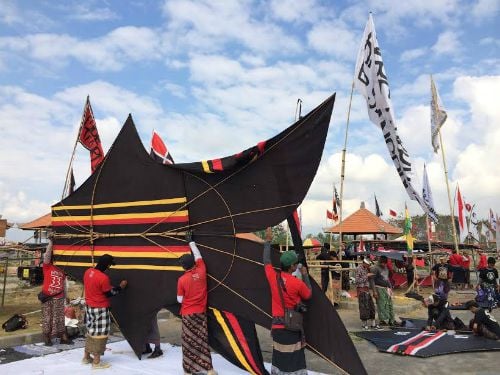
by World Moms Blog | Sep 8, 2015 | 2015, Asia, Guest Post, Indonesia, World Motherhood
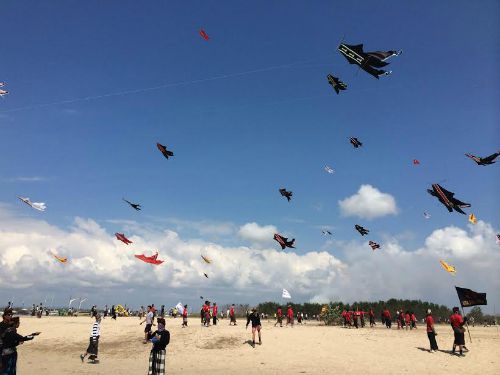
Dry season on the island of Bali brings along some really strong winds; the whistling, tree bending kind. It’s still extremely hot, but at least the afternoon winds are refreshing, making it the perfect conditions for kite flying season.
This year I promised the kiddos that I would get them a kite to fly in the park. I found a little shop close to the school that sold some inexpensive kites in the shapes of dragonflies. I bought a red, black and yellow one and took the kiddos to the Lapagnan Puputan Park after class. In fact, the lady that sold me the kite spoke to me in her native Indonesian and said the kite was 15 thousand rupiahs, but I understood 50 thousand. Thankfully, she was kind enough to chase after me with my change when I had already walked away with the kite. Expat life…
The winds were so strong that it really was not that easy. Unfortunately, our string wasn’t a full constant thread but had a knot tying two pieces together. It didn’t take long for it to break with the wind. Big Kiddo decided to run while holding the kite and he had a better time of it. On that note, next is a photo from a much more successful kite flying attempt he had with his father weeks prior by the ocean. Check out his airplane kite!
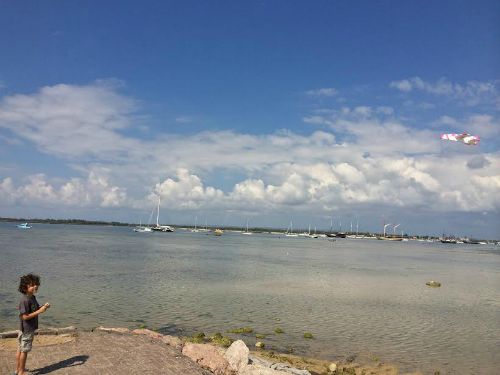
We love seeing the kites everywhere, out the windows of our house and when we drive somewhere the kiddos always find new ones with beautiful colors and start counting how many owl shaped ones or how many fish ones they see on a trip somewhere.
Kite flying in Bali is not just a pastime for the kids; it is a cultural and religious phenomenon that takes over life itself for the entire dry season.
Between May and September, the sky is spotted with kites, of all sizes and colors; many are as far away as a kilometer it would seem (I’m sure it’s not that far up, but it feels like that).
Everywhere you look there are kids flying small kites, in parks and beaches there are groups of men flying giant kites, on the sidewalks kids making kites out of sticks and plastic bags.
There is no piece of sky untouched by a kite on a string. You may even trip on one if you aren’t paying attention. If the winds are good, the kids will tie their kite to a rock or tree and play ball while it flies.
Why are kites so important in Bali?
Kites are seen as an offering to the gods, a fun way to appease the demons, and good old competition. All with the hopes of having a successful harvest that year.
Apart from the kites for children, there are ceremonial kites that can be so big they need teams of 10 men to fly. They come in different combinations of red, black and white.

Every August, the village of Sanur holds a kite flying competition on the beach. There are three different categories, the classic fish shape kite, kites with a tail that can be as long as a 100 meters, and “new creation” kites which are usually animals or other crazy constructions.
Every team of kite fliers has flyers, flag bearers, and Gamelan musicians to accompany the flying of the kites. The competition consists of points for best launch, height of flight, length of flight and amount of control. Kudos for the kites that don’t fall to the ground!
Made with very thin cloth sewn onto bamboo sticks, the traditional fish-shaped kite is the kind that the kids learn to make at school with pieces of plastic bags. Once the kites are ready to be taken somewhere to fly, be it for the competition or for practice, the flying teams pack up the kites together on a truck, stopping traffic for almost an hour. Whenever we run into one, the kiddos love seeing what kinds of kites are being packed on the truck.
Given my own attempts at kite flying, perhaps next time we’ll just enjoy watching the experts!
This is an original guest post to World Moms Blog by Orana Velarde of Bali, Indonesia. She can be found on her blog, Crazy Little Family Adventure.
Photo credits to the author.
World Moms Blog is an award winning website which writes from over 30 countries on the topics of motherhood, culture, human rights and social good. Over 70 international contributors share their stories from around the globe, bonded by the common thread of motherhood and wanting a better world for their children.
World Moms Blog was listed by Forbes Woman as one of the "Best 100 Websites for Women 2012 & 2013" and also called a "must read" by the NY Times Motherlode in 2013. Our Senior Editor in India, Purnima Ramakrishnan, was awarded the BlogHer International Activist Award in 2013.
More Posts

by To-Wen Tseng | Sep 7, 2015 | 2015, China, Death and Dying, Humanity, Refugees, To-Wen Tseng, USA, World Motherhood
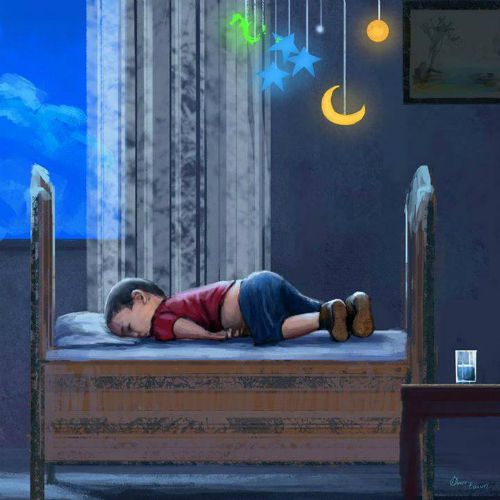
I have a story about being a mother and a refugee.
It was 1949, in the middle of Chinese civil war. A mother trying to escape from the war-torn China got on a refugee boat in Guangzhou with her 3-year-old and 1-year-old.
The boat was sailing to Kaohsiung. Soon after they left the port, the two children started to cry. People on the boat were afraid that the kids crying would attract the communist navy searching for refugees on the sea, and were going to throw the kids into the sea.
The mother fought against those people with all her strength, promising that she would stop the children crying. She took off her blouse, put the two kids under her arms, one on each side, and then put her nipples into the kids’ mouths. Comforted by their mother’s breasts, the children calmed down. The mother kept nursing her children until they arrived in Kaohsiung safely two days later.
The mother in the story was my grandmother. Those two children were my father and my uncle.
I heard the story from my grandmother when I was a little girl. It’s been such a long time that I almost forgot about it, or I never really paid attention to it. I was too young to understand what being a mom, or being a refugee is really like.
Then the #HumanityWashedAshore image of a 3-year-old Syrian boy lay dead on the beach shocked the world. It is reported the boy, Aylan, drowned with his mother and 5-year-old brother on a short run from Turkey to the Greek Island of Kos.
The image shocked me, too. I thought of my 2-year-old, more than that I thought of my grandma. For the first time, I tried to imagine what it really was like for a 20-year-old young mother to get on an over-loaded refugee boat with two toddlers and to continue to breastfeed them for two days in the middle of the sea to flee from violence, oppression and poverty. How hard, or how dangerous it could be? My grandma said, “we could have died.” Now I knew she was serious.
Aylan was not one person. Three more children died last night trying to cross that TWO MILES to safety.
Aylan could be my dad, or my uncle, or any of us. War was never very far away from us. It’s often just one generation or two miles away.
Aylan’s father told The Telegraph, “let this be the last.” I hope so but highly doubt it. History repeats itself. When will we ever learn?
Read more: Things we can do to help. Now.
This is an original post to World Moms Blog by To-wen Tseng of California, USA.
Photo credit to Europe Says OXI.

by Meredith (USA) | Sep 1, 2015 | 2015, Advice, Awareness, Being Considerate, Caring, Communication, Family, Happiness, Husband, Kids, Life Balance, Life Lesson, Motherhood, Priorities, Relationships, USA, World Motherhood
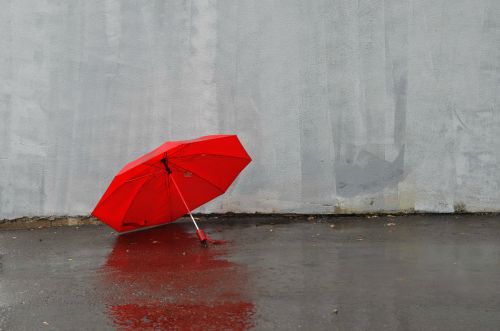
It happened very slowly. It started when my children were small and needed so much attention. They consumed most of my day and by the end of those early days, I was completely spent. I could barely hold my eyes open to read a book before bed let alone hold a conversation with another adult.
Then he started traveling for business and would be gone for two or three weeks at a time. It was scary being alone with my two small children, but it also helped me learn that I could do many things on my own. I learned how to manage the house, fix things and take care of my children while my husband was away.
As the kids grew from babies to toddlers and then started elementary school, I volunteered to help with many of their activities: Scouts, church class, school plays, charity events. My days are consumed with getting my kids ready for school, fulfilling my volunteer obligations, helping with and checking homework, running the kids to their different after school activities, cooking dinner and getting them to bed at a decent time. At the end of the day, I still feel completely spent. That is how my life has gone on for the last few years. I thought I was doing a great job with everything… (more…)
Meredith finds it difficult to tell anyone where she is from exactly! She grew up in several states, but mainly Illinois. She has a Bachelor of Science degree in Elementary Education from the University of Illinois at Champaign/Urbana which is also where she met her husband. She taught kindergarten for seven years before she adopted her son from Guatemala and then gave birth to her daughter two years leter. She moved to Lagos, Nigeria with her husband and two children in July 2009 for her husband's work. She and her family moved back to the U.S.this summer(August 2012) and are adjusting to life back in the U.S. You can read more about her life in Lagos and her adjustment to being back on her blog: We Found Happiness.
More Posts



















